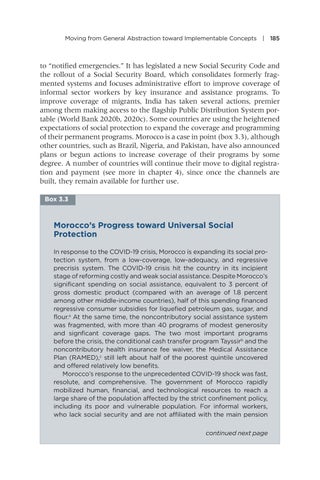Moving from General Abstraction toward Implementable Concepts | 185
to “notified emergencies.” It has legislated a new Social Security Code and the rollout of a Social Security Board, which consolidates formerly fragmented systems and focuses administrative effort to improve coverage of informal sector workers by key insurance and assistance programs. To improve coverage of migrants, India has taken several actions, premier among them making access to the flagship Public Distribution System portable (World Bank 2020b, 2020c). Some countries are using the heightened expectations of social protection to expand the coverage and programming of their permanent programs. Morocco is a case in point (box 3.3), although other countries, such as Brazil, Nigeria, and Pakistan, have also announced plans or begun actions to increase coverage of their programs by some degree. A number of countries will continue their move to digital registration and payment (see more in chapter 4), since once the channels are built, they remain available for further use. Box 3.3
Morocco’s Progress toward Universal Social Protection In response to the COVID-19 crisis, Morocco is expanding its social protection system, from a low-coverage, low-adequacy, and regressive precrisis system. The COVID-19 crisis hit the country in its incipient stage of reforming costly and weak social assistance. Despite Morocco’s significant spending on social assistance, equivalent to 3 percent of gross domestic product (compared with an average of 1.8 percent among other middle-income countries), half of this spending financed regressive consumer subsidies for liquefied petroleum gas, sugar, and flour.a At the same time, the noncontributory social assistance system was fragmented, with more than 40 programs of modest generosity and signficant coverage gaps. The two most important programs before the crisis, the conditional cash transfer program Tayssirb and the noncontributory health insurance fee waiver, the Medical Assistance Plan (RAMED),c still left about half of the poorest quintile uncovered and offered relatively low benefits. Morocco’s response to the unprecedented COVID-19 shock was fast, resolute, and comprehensive. The government of Morocco rapidly mobilized human, financial, and technological resources to reach a large share of the population affected by the strict confinement policy, including its poor and vulnerable population. For informal workers, who lack social security and are not affiliated with the main pension continued next page
